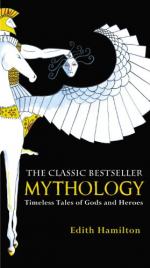|
|
Mythology Part 2, Chapter 2: Eight Brief Tales of Lovers
Mulberries used to be white but turned red because of Pyramus and Thisbe. They were beautiful youths who grew up in neighboring houses in Babylon. They fell in love, but were forbidden to be together by their parents. They spoke to one another through a hole in the wall between their houses. They agreed to meet near a tomb on the outskirts of the city near a mulberry tree. Having sneaked out at night, Thisbe saw a lioness and escaped the creature, but dropped her cloak. The lioness tore it up and dripped blood from something else on it. Pyramus found the cloak and killed himself with a dagger near the tree. Thisbe got to the tree to find her Pyramus dead, and killed herself to be with him. "The deep red fruit of the mulberry is the everlasting memorial of these true lovers and one urn holds the ashes of the two whom not even death could part." Part 2, Chapter 2, pg. 138.
The earliest musicians were gods, but the greatest of mortals was Orpheus, whose mother was a muse. When he sang and played, his power had no limit. Creatures and men would follow him about. He sailed with Jason on the Argo. His tune countered the music of the Sirens. He met and wooed a woman named Eurydice. Soon after they were married, however, a serpent killed her. Bereft, he grieved her loss and traveled to the underworld, using his music to soothe Cerberus. The god of the underworld heeded his pleas to release Eurydice under the conditions that he not look at her until they get to the surface. Just as they approached the surface, he turned and she disappeared. He was not allowed to reenter the underworld and went about the world playing his music until he was ripped to pieces by the Maenads.
Ceyx and Alcyone ruled over Thessaly. They loved each other dearly and were never apart. He had to leave her to go on a trip and even though she didn't want him to go, he left. A great storm hit him on the sea and he died. She counted the days he was gone and prayed for his safe return. Hera sent Iris to have Sleep send her a dream of the truth. Sleep sent his son and he took up the form of drowned Ceyx. Alcyone was grief-stricken and went to the shore. She found his body floating in the surf. She ran into the sea to drown herself but found that she had turned into a seagull. He rose again as a bird. In peaceful seasons they can still be seen together.
Pygmalion was a great sculptor and a misogynist who refused to ever marry. Regardless of this, he labored over a statue of a beautiful woman. He fell in love with it, kissed it, bought it gifts and put it to bed. Venus observed this love, and on the day of her festival, he asked for a woman like his statue. When he went home the statue was alive. He named her Galatea. They were married.
In Asia Minor, there were two trees of different species that grew from the same trunk. Jupiter often went about the world looking for fun with Mercury. He and Mercury went into a town in the form of poor beggars. No house would let them enter. A poor old man and woman, Baucis and Philemon, invited them in and offered their hospitality. When the wine bowl never emptied, they knew that their guests were divine. They were upset that they did not kill their only goose for the travelers. Jupiter killed the whole town and spared them. Their home was turned into a golden temple. Jupiter offered them anything they wanted and they asked to die together kissing. They became a linden and an oak tree growing from the same trunk.
The youth Endymion possessed surpassing beauty. The moon was in love with him and took him to a glade where he would sleep and be beautiful forever. She returns to him to kiss him as he sleeps. This brings her pleasure but worry because he will never wake.
Daphne was a young and independent huntress who wanted very much to be like Artemis. Apollo was in love with her and she fled him. Apollo wanted to catch her and dress her like a woman instead of a huntress. He chased her but she was changed into a laurel tree and he was thwarted. It is because of this that the laurel is Apollo's tree.
"In Ortygia, an island which formed part of Syracuse, the greatest city of Sicily, there is a sacred spring called Arethusa. Once, however, Arethusa was not water or even a water nymph but a fair young huntress and a follower of Artemis." Part 2, Chapter 2, pg. 157
Arethusa came upon a river and swam in it. The god of the river fell in love with her and pursued her. She wanted nothing to do with him and fled. She plunged into another body of water. The god, Alpheus, turned back into a river and found her underground. She turned into a stream and their waters mingled together.




